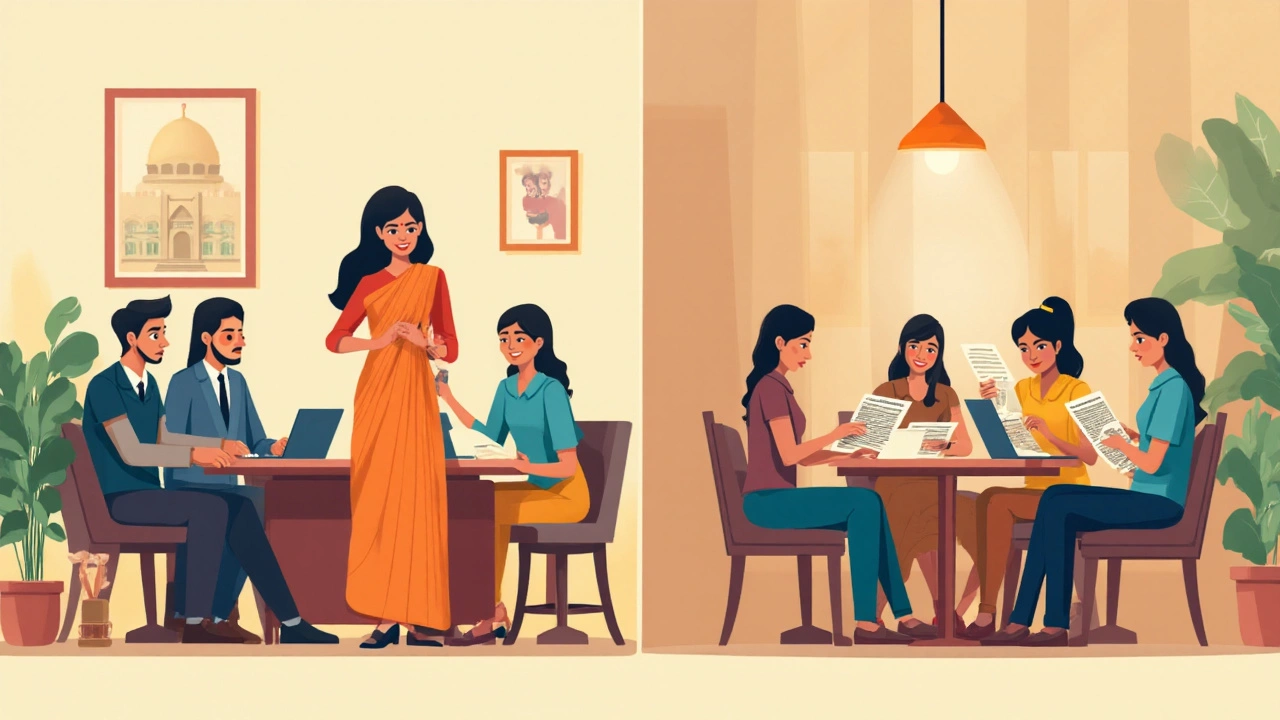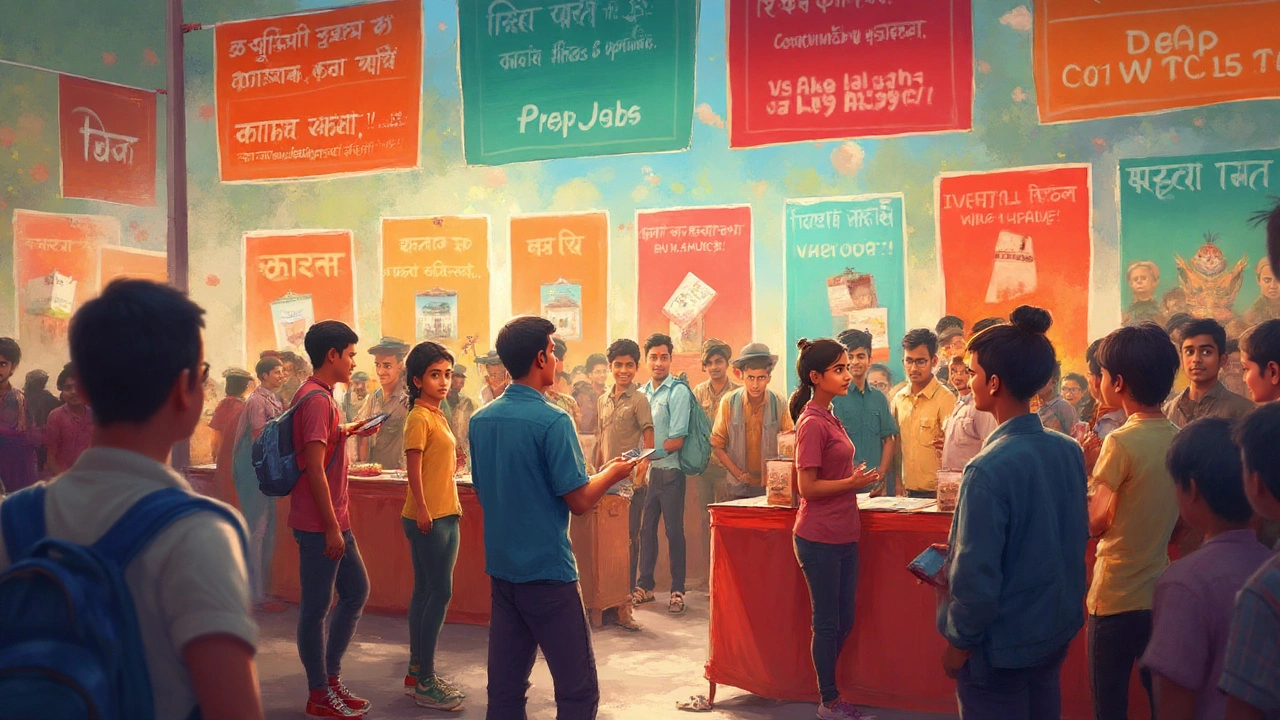Imagine this: your neighbor has just landed a cushy government job and, almost overnight, her Instagram is full of travel pics, family parties, and not a single post about working weekends. Jealous? Of course. But the real kicker is she didn’t study for years or pull her hair out over impossible exams. There’s this myth that all government jobs are behind sky-high competition walls, but some roles really are more straightforward, with decent pay and security. The trick is knowing what’s out there and how to aim smart.
Why Government Jobs Are So Popular in India
If someone tells you their parents didn’t dream of seeing them in a government seat, they’re probably lying or joking. The classic perks—steady income, job security, health insurance, retirement benefits—still make government work the “golden goose.” The numbers speak volumes. In 2023 alone, over 2.5 crore people applied for government jobs across India according to the Ministry of Personnel. Even with millions applying, only a slice makes it to the finish line. Besides security, the work-life balance is a huge magnet. Not every private job guarantees you’ll be home on time for dinner, but many government posts do.
Beyond that, there’s the respect factor. “Sarkari naukri” (government job) still turns heads at weddings, family gatherings, and even on Tinder bios. Some jobs let you serve the nation, while others are more about smooth paperwork from nine to five. For young graduates or those stuck in the private grind, the chance to get steady pay—even when the economy wobbles—matters a lot more these days. There’s also been an expansion in jobs—think digital services, e-governance, railways, or postal services—where opportunities now reach candidates in smaller towns and cities.
Of course, not everything is peachy. The selection processes can be grueling for popular high-rank posts. That said, several roles fly a bit under the radar. If you know which ones, you can cut through the crowd without burning out on endless mock tests. Which government job is best or easiest? A lot depends on your skills, interests, and how much patience you’ve got for the exam circus.
Cracking the Code: What Makes a Government Job 'Easy'?
Let’s be honest—when people say “easy,” they rarely mean the job is laziness-approved or a cakewalk. They’re usually looking for jobs with a real shot at selection, a less nightmarish exam process, and a good chance to get posted close to home. So, what exactly makes a government job “easy” compared to those big-ticket posts like IAS or IPS?
- Competition: The number of seats versus applicants is key. For example, the Staff Selection Commission (SSC) Multi-Tasking Staff (MTS) exam draws around 30 lakh applicants, but over 10,000 positions open up every year. Your chances increase if you widen your options—state-level job exams usually get fewer applicants than national ones.
- Selection Process: Fewer stages make things easier. For example, many clerk jobs have only an online test and document check, while UPSC CSE stretches over a year with prelims, mains, and interviews.
- Exam Syllabus: The complexity of the test matters. Office Assistant roles in Railways or Banks feature basic math and reasoning, not advanced subjects or heavy current affairs.
- Qualifications: Some jobs require just a 10th or 12th-standard pass. They’re not asking for engineering, medicine, or other elite degrees. Andhra Pradesh Grama/Ward Sachivalayam jobs are a typical example—a 12th-pass can apply.
- Physical Tests: Not everyone wants to run 1600 meters in seven minutes. If that’s not your vibe, desk-based clerical roles are much simpler to grab.
To put things in perspective, here’s a snapshot of how “ease factor” looks for popular central government jobs:
| Job | Min. Education | Selection Steps | Average Vacancies/Yr | Chance of Selection |
|---|---|---|---|---|
| SSC MTS | 10th Pass | Written Test | ~10,000 | Moderate |
| Railway Group D | 10th Pass/ITI | CBT, PET | ~1,00,000 | High |
| Bank Clerk | Graduate | Prelims, Mains | ~10,000 | Moderate |
| State PSC Group C | Varies | Written Test | 2,000-10,000 | Moderate to High |
So the real trick is knowing where the barriers are lowest, but satisfaction isn’t sacrificed. You want a job that isn’t just easier to get, but also fits your lifestyle or dreams.

Best and Easiest Government Jobs You Should Consider
Feeling lost in the sea of job listings? Here’s a concrete list of roles that tick both “good to have” and “easy to crack” boxes. It’s not about picking a low-status gig, but something that’s practical, pays the bills, and might just surprise you with its perks.
- SSC Multi-Tasking Staff (MTS): You only need a 10th pass certificate. Duties are basic—delivering files, clerical work. Not glamorous, but stable. Upcoming changes in pay scales after the 7th Pay Commission make it better—starting salary is around ₹18,000–₹22,000/month. The cutoffs aren’t sky-high, so if you’ve basic maths and reading skills, you’ve got a shot.
- Railway Group D: This one’s a sleeper hit. Railways need helpers, track maintainers, and pointsmen in large numbers. SSC executes the recruitment. With over 1 lakh jobs announced some years, the math is in your favor. Age bar is flexible (18–33), and exam pattern is basic.
- Postal Assistant/Sorting Assistant: Hiring is through a test by the India Post. Requires 12th pass. With e-commerce booming, the postal network just keeps getting busier, meaning more openings. Office-based jobs mean you skip the field work and heavy lifting.
- State PSC Clerical cadres: State Public Service Commissions recruit Class III or IV clerks, data entry operators, and assistants. The bulk of these jobs are in revenue offices, local bodies, or schools. They’re usually based in your home state and exams are syllabus-light.
- Banking Clerical Cadre (IBPS/State Banks): Unlike Probationary Officers, clerical-level hiring is more frequent and less competitive—syllabus covers reasoning, simple maths, grammar. Good for graduates not seeking transfers every couple of years. Promotions and salary hikes are steady.
- Grama/Ward Volunteers (Andhra Pradesh example): The state government hires these posts at a whopping scale (over 1.5 lakh positions advertised in 2024). The work is mostly documentation and local assistance. 12th pass or graduates can apply, and recruitment completion is swift—just one interview round and verification.
What about jobs with unique perks? You’ll find roles that offer free housing (Railways, some state jobs), travel (Tourism, Roadways), and healthcare (ESIC, Health Ministry) even in entry-level clerical or support staff posts. Look locally—Panchayat and Urban Local Body jobs in states like Tamil Nadu, Kerala, and Maharashtra can be surprisingly accessible and pay above minimum wage with pension included.
Now, that’s not to say you should rush into any “easy” job blindly. Some roles like police constable, though easier entry-wise, involve physical tests and tough field conditions. If you’re allergic to outdoor work or craving an air-conditioned office, pick accordingly.
Application Hacks: How to Actually Get the Job
Seeing thousands of vacancies isn’t good unless you know how to crack the selection game. People miss out not because of lack of skill, but because of basic goof-ups. Here’s a step-by-step on boosting your real chances:
- Track Openings Broadly: Don’t stick to just UPSC or banking jobs. Sign up for alerts on state government sites, SSC, Railway Recruitment Boards, and India Post. Telegram and WhatsApp list channels can push live updates.
- Tidy up Your Documents: Missing certificates, wrong names in mark sheets, or late filled forms disqualify hundreds daily. Scan everything—ID proof, pass certificates, caste/category documents.
- Practice through Official Mocks: Free or cheap practice sets on official portals help. The more your brain recognizes the pattern, the faster you get.
- Study Syllabus Smartly: If the exam is only basic maths and reasoning, there’s no glory in spending months reading ancient history. Prioritize the high-weight topics.
- Apply to Multiple States: Your “home state” advantage is real, but sometimes an out-of-state job could be faster to get (and maybe in a city you’d love to live in).
- Be Deadline-Smart: Many forms close in under 3 weeks of notification. The earlier you apply, the more time you have for document issues.
- Avoid Paying for Shady Coaching: For basic jobs, most coaching materials are available free. Invest that money in a good internet plan instead.
- Watch Age Limits: Most jobs are open to 18–27 or 18–33. OBC, SC/ST, or women candidates often get a few years’ relaxation—don’t ignore that bonus time.
- Get References from Past Selectees: Forums like Quora or OdishaJobs often feature people who cracked these jobs. A quick DM gets you tested advice on cut-off trends and interview style.
- Document Verification is Not a Joke: Over 12% of all government job offers got canceled in 2022 due to botched paperwork. Triple-check your attested copies, or risk wasting all your exam sweat.
Mind blowing, right? Simple mistakes, not tough exams, keep most people from landing one of these "easier" government posts. Give yourself every small edge.

Beyond the Hype: What to Expect After Getting the Job
So, say you get through. Day one always feels like you’ve entered a whole new world—old buildings, staff who’ve been there since your parents were in school. But here’s the fun: these jobs grow with you. Most "easy-entry" roles don’t mean you're stuck forever. Internal exams and performance let you climb up—clerks to officer level, helpers to supervisors. In banks, a clerk can become manager in seven or eight years. In railways, group D folks get promoted with barely any extra test drama, especially if they stick around, pass internal assessments, and grasp the office rules quickly.
Let’s bust a few myths. No, not all government offices are stuck in the 1980s. Many departments—like passport offices and municipal corporations—use digital systems, so your computer skills matter. The salary depends on your region, but the recent Pay Commission changes mean most entry-level government workers start higher than private sector freshers (think ₹18,000–₹30,000 plus bonuses). Pension plans are back in many states—look at Madhya Pradesh or Rajasthan reviving old pension schemes for new employees in 2023—and these add up to lakhs over retirement.
But be real: the work can at times get repetitive, and transfers (though rare at lower levels) can pop up every five or ten years depending on department needs. There’s less stress than the private sector, especially if you aren’t obsessed with rapid promotions. The biggest shift? Job security—you won’t get a pink slip when there’s an economic disaster outside. Your pay comes in, come rain or pandemic.
Where are people happiest? Meet Priya from Hyderabad, who started as a postal clerk and now manages her own team. She put it best: "I thought it was a boring desk job, but I have time for my family, I get promoted every few years, and I haven’t missed a festival in years." That lifestyle trade-off is what keeps people hooked, decades in. It’s not about being fancy, it’s about living well and sleeping easy.
